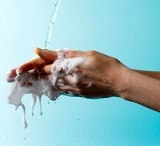Food, hand-washing and the ick factor
Very few people wash their hands adequately prior to preparing or eating food. Most of us don’t even know how to wash hands properly.
There are many good reasons to wash hands:
- Pathogen spread – from yourself, from others, from one contaminated food to another (meats, produce, etc.)
- Chemical spread – whatever chemicals are on your hands can go directly into the food being prepared. This can include pesticides, hand sanitizers (ick), cleaning products, hand lotions, etc.
- The ick factor – “Ick, what’s that slime on your hands and do I really want that in my food?”
The most memorable item I learned about hand-washing is that we need to wash for at least 20 seconds — the time it takes to sing the entire “happy birthday song” twice (and slowly). Watch anyone in any kitchen or public bathroom, and very few come close to washing for that long.
It’s human nature to think that our own hands are cleaner than everyone else’s, and that maybe we ourselves have less need to wash our own hands before preparing food for others. Well, everyone benefits if we all wash our hands well before cooking or eating.
Many years ago I got giardia, which laid me out for weeks, and my doctor and I determined that I probably got it from a food-service worker who did not wash hands properly. A big “ick.” It was a real wake-up call about the need for hand-washing.
So, if you hear me singing the happy birthday song while washing my hands in the kitchen, you can be thankful for my commitment to good hygiene.
Guidelines for hand-washing
- Wet your hands with clean running water
- Apply liquid, bar, or powder soap
- Lather well
- Rub your hands vigorously for at least 20 seconds. Remember to scrub all surfaces, including the backs of your hands, wrists, between your fingers and under your fingernails
- Rinse well
- Dry your hands with a CLEAN or disposable towel or air dryer
- If possible, use your towel to turn off the faucet
(Information on hand-washing and using hand sanitizers can be found at the information sources below.)
Information sources for handwashing
- The Mayo Clinic
- The Centers for Disease Control and Prevention (CDC)
- CDC downloadable poster
- World Health Organization (WHO)
- WHO downloadable poster
Lastly, while we’re addressing kitchen sanitation, please use a clean tasting spoon each time you sample what you are cooking. It’s a really big ICK to taste from the stirring spoon, then put it back into the food. It’s also a way to spread germs, especially in uncooked foods. Yes, cooking may sanitize the spoon, but people still don’t want to eat other people's saliva, sterile or not.
Happy holidays, and stay clean and healthy!
UPDATE (Dec. 15, 2010): A new press release from the Centers for Disease Control and Prevention reports that 1 in 6 people get sick from foodborne illnesses each year. The CDC also reports that keeping hands clean is one of the best ways to prevent the spread of infection and illness.


Best regards
Posted by hiit on April 8, 2012 at 11:28 PM